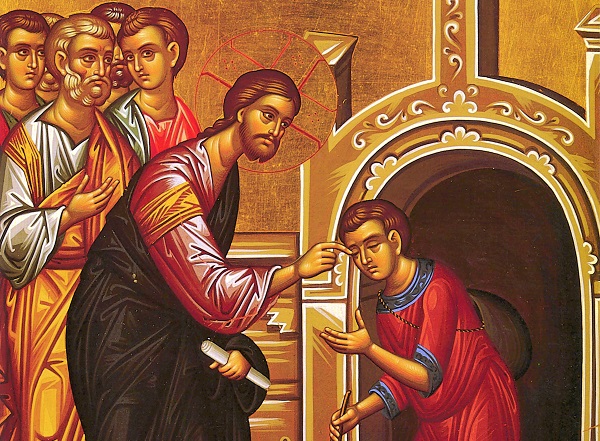Saint John Chrysostom, Homily 36 on the Acts of the Apostles
7 June 2021(Epistle for the Sunday of the Blind Man)
Acts, 16, 25-40
‘And at midnight Paul and Silas prayed, and sang praises unto God: and the prisoners heard them. And suddenly there was a great earthquake, so that the foundations of the prison were shaken, and immediately all the doors were opened, and everyone’s bands were loosed’.
What is the equal of these souls? These men had been scourged; had been badly hurt; had been cursed; were in peril of their lives; were put in the stocks [?]; and were thrust into the innermost prison. But they were unable to sleep and sang hymns all night long. Do you see what a blessing tribulation is? We, in our soft beds, with no-one to be afraid of, pass the whole night in sleep. Perhaps this is why they spent the whole night singing: precisely because they found themselves in these difficulties. The power of sleep could overcome them, pain could not cow them, nor did fear cast them into dejection. In fact, these were the very things that kept them wakeful and filled them with great delight.

‘But about midnight Paul and Silas were praying and singing hymns to God’, it says, ‘and the prisoners were listening to them’, because this must have seemed so strange and surprising. ‘Suddenly there was a great earthquake, so that the foundations of the prison were shaken; and immediately all the doors were opened and every one’s fetters were unfastened’. The jailer woke up, and was amazed at the sight of the open doors. ‘When the jailer woke and saw that the prison doors were open, he drew his sword and was about to kill himself, supposing that the prisoners had escaped. But Paul cried with a loud voice, “Do not harm yourself, for we are all here”’. The man was amazed at Paul’s kindness; he wondered that Paul could be so brave in not escaping and that Paul had stopped him from shedding his own blood. ‘And he called for lights and rushed in, and trembling with fear he fell down before Paul and Silas, and brought them out and said, “What must I do to be saved?”’. Do you see how greatly the miracle affected him? ‘And they said, “Believe in the Lord Jesus, and you will be saved, you and your household”. And they spoke the word of the Lord to him and to all that were in his house’. In this way they gave immediate proof of their goodwill towards him.
‘And he took them the same hour of the night, and washed their wounds, and he was baptized at once, with all his family. Then he brought them up into his house, and set food before them; and he rejoiced with all his household that he had believed in God’. He washed them as a sign that he was repaying their kindness and was honoring them for what they’d done.
[This is the end of the Epistle reading, but Saint John’s next comments are worth noting. Essentially he points out that Saint Paul was not prepared to accept arbitrary actions on the part of the authorities and that he was willing to hold them publicly to account].
‘When day dawned, the magistrates sent their officers to the jailer with the order: “Release those men.”’. It may be that they’d heard what had happened and didn’t want to be involved in their release directly. ‘The jailer told Paul, “The magistrates have ordered that you and Silas be released. Now you can leave. Go in peace”. But Paul said to the officers: “They beat us publicly without a trial, even though we are Roman citizens, and threw us into prison. And now they want to get rid of us quietly? No! Let them come themselves and escort us out.”
The officers reported this to the magistrates, and when they heard that Paul and Silas were Roman citizens, they were alarmed. They came to appease them and escorted them from the prison, requesting them to leave the city. After Paul and Silas came out of the prison, they went to Lydia’s house, where they met with the brothers and sisters and encouraged them’.
Despite the declaration of the magistrates, Paul still didn’t leave immediately, perhaps for the sake of Lydia and the others, and perhaps, also, to put fear into the authorities. By acting in this way, it couldn’t be claimed that they’d been set free at their own request, and this stance may have gone to strengthen the resolve of the others. The injustice was threefold: first, they were Romans; second, there was no verdict against them; and third, they were thrown into jail in public. You see how there were many human arguments that came into play.






